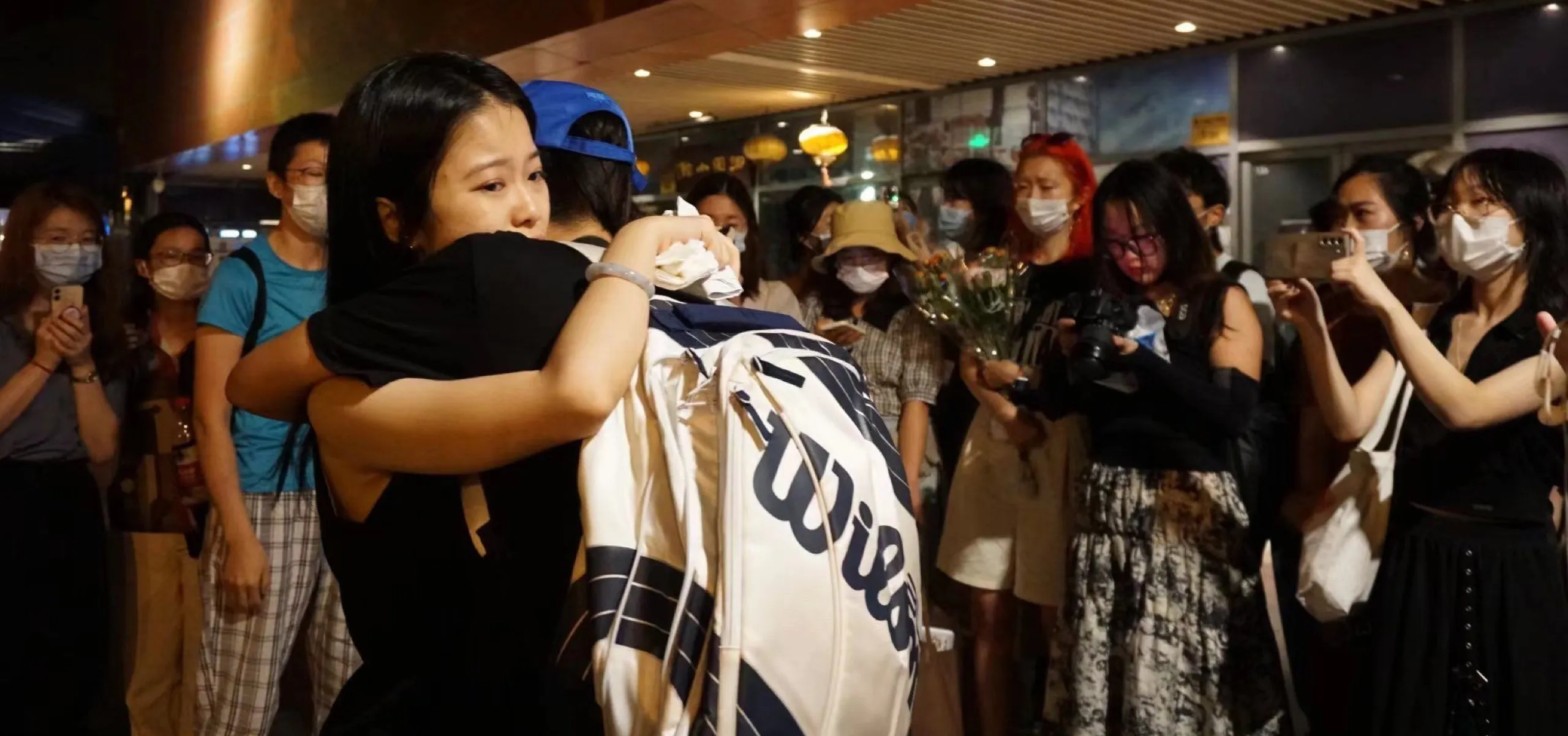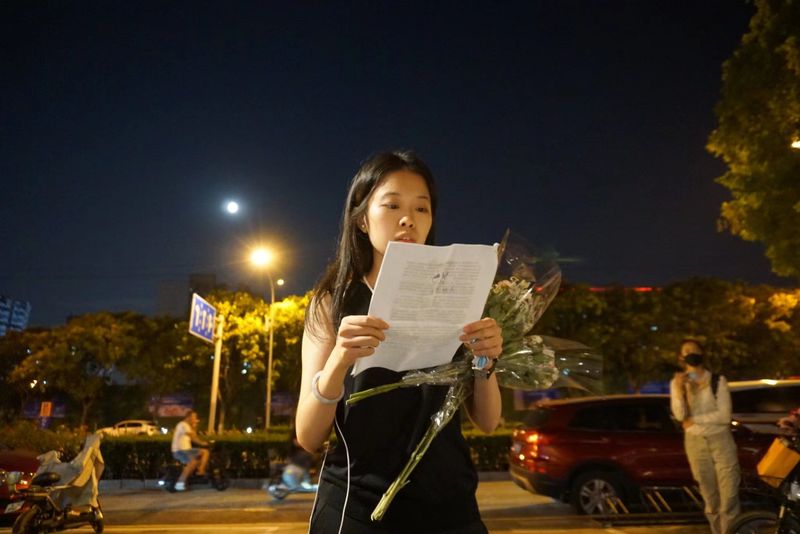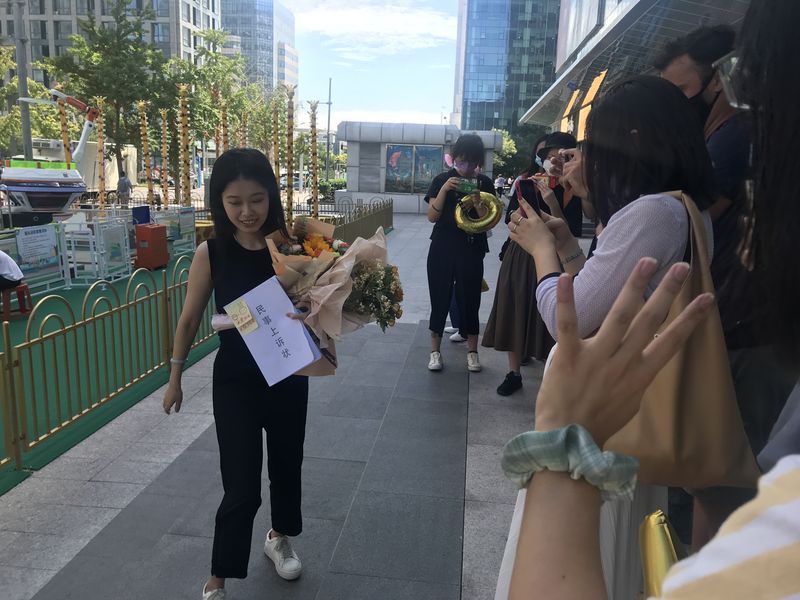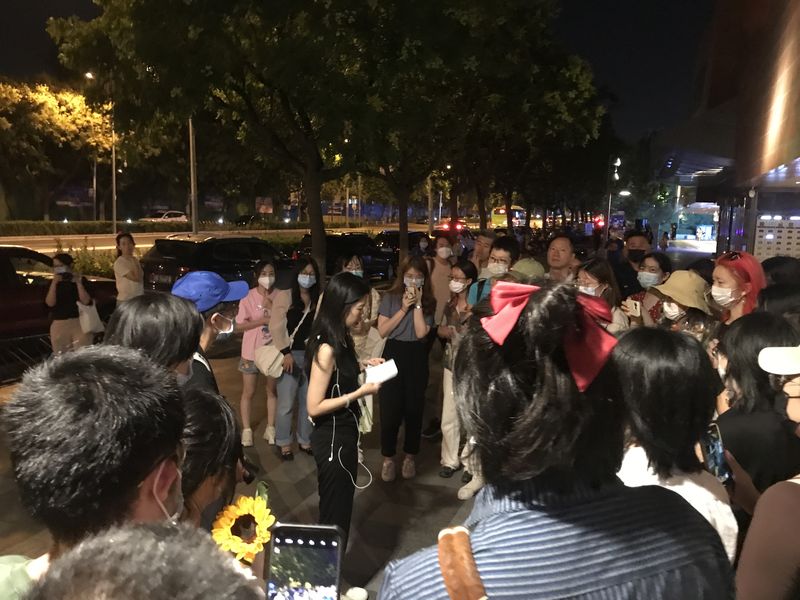China’s highest-profile sexual harassment case ended in another defeat this week, but its plaintiff and supporters are not giving up
“On June 9, 2014, I was a 21-year-old student in university…when I was sexually harassed by Zhu Jun in the dressing room, I wasn’t able to call for help immediately because of the shame I felt over sex,” Zhou Xiaoxuan told around 30 supporters several blocks away from the First Intermediate People’s Court of Beijing on Wednesday night, reading from a printed statement hours after one of China’s most high-profile sexual harassment cases ended in what might be its final defeat.
The court upheld last September’s decision by the Haidian People’s Court to dismiss Zhou’s lawsuit against Zhu Jun, formerly a presenter on state broadcaster CCTV, for sexual harassment, citing a lack of evidence. Zhou, better known by the Chinese public as Xianzi, appealed the decision, and had been granted a second hearing on Wednesday, August 10. In 2018, Zhou accused Zhu of groping and forcibly kissing her in the dressing room during the filming of the show Art Life while she was an intern, and later sued him after he attempted to sue her for reputation damage.
The involvement of a well-known television host immediately caught the public’s attention, and the case has been at the center of the Chinese #MeToo movement, finally going to court three years later in December 2020. As the years continued to tick by, with news and discussions of gender-based violence more and more prominent in Chinese media, the case itself felt more hopeless than ever to Zhou as well as her supporters—yet its importance had only intensified.
“The whole day felt like Mission Impossible. [We were] playing hide-and-seek everywhere,” says one of Zhou’s supporters at the courthouse, who identified herself as “Peacock” out of fear of reprisal at her job in a Beijing governmental institution, to TWOC. Peacock has traveled to the courthouse to show support for Zhou during all three court sessions of the case, and believes the police presence was heavier this time compared to both the previous sessions.
In the previous two sessions (the second of which TWOC also covered), large crowds of supporters had waited outside the court for the decision, chanted, and accepted interviews from various Chinese and international reporters. But on Wednesday, the four roads around the courthouse and the open squares nearby were cordoned off, filled with police cars and officers both in uniform and plainclothes patrolling on the roads and checking the passersby’s ID.
The strict control impeded Zhou’s supporters from gathering into groups, but some were still wandering in the neighborhood. A 24-year-old college student from Fujian, in Beijing for a summer internship, had specifically asked for the day off in order to show her support in person. “It has nothing to do with the decision anymore. People expected the court’s decision wouldn’t be positive, which made them want to come even more,” she tells TWOC.
A 26-year-old IT worker from Beijing, who wanted to be identified by her surname, Su, tells TWOC she just learned of the case, and felt that her presence was proof of the case’s significance. “The fact that I found out about it shows its influence has been expanding. More people are able to find out about it and become aware of what Xianzi went through, which is a positive influence.”
Zhou herself had anticipated a loss. On a phone call with TWOC on Wednesday, Zhou revealed her plan of appealing for a retrial at a later date, although she doesn’t believe it will be granted. “We are making every effort so we can show the litigants have done all they can, and what’s left is for society, for the judicial system to rethink why they didn’t do enough,” she said. “My lawyers and I will try everything we can to [introduce this question]; it’s what I ought to do.”
Since Zhou first brought her accusation to light, both the public and the Chinese judicial system have faced plenty of questions on gender-based violence, with several notable incidents just this year highlighting the tough battles still to be fought in China’s legal system as well as the realm of public opinion. In January, a high-profile case of a woman who was trafficked, chained to a hut, and forced to have eight children with a man in Fengxian county of Xuzhou, in the eastern Jiangsu province, brought attention to the persistent issue of trafficking of women. In June, a video of a group of young women brutally attacked by several men in a restaurant in Tangshan, Hebei province, after one of the women rejected the sexual advances of one of the men, sparked anger nationwide over female safety in public spaces and society’s awareness of sexual consent.
But while public outrage has risen, it is also heavily controlled. Zhou has been banned from posting on her Weibo account since she updated her followers on May 20, 2021, on the progress of her case. On Tuesday night, a few Chinese feminists alleged that their WeChat groups were “shadow banned” (meaning messages users sent couldn’t be viewed by anyone else, though the group remained active) after they shared information about Zhou’s hearing. On Wednesday night, Zhou and supporters were unable to gather outside the courthouse after the hearing, and reconvened later at a restaurant in a mall a 15-minute walk away.
The strict regulations prevented Zhou from being able to properly thank her supporters, which she was keen to do when she spoke to TWOC: “To them I am a stranger, but they were willing to pay the price and take risks to be there. Every time I saw them, I would think what more I could do to repay them, to repay the community that cares about me,” she says, emphasizing that her lawsuit was not just an individual case, but an opportunity for her to serve the public and bring more protection against sexual harassment into China’s judicial system.
In 2019, China’s Civil Code added “sexual harassment” as an independent claim and over the past several years, the number of filed cases are few. According to a report on sexual harassment laws and court cases published by Beijing’s Yuanzhong Family and Community Development Service Center, only 110 sexual harassment lawsuits were filed nationwide between 2019 and 2021, representing only 21.82 percent of the related cases in China. The report concluded that under the current judicial system, the price for victims to seek justice is high while the compensation they may receive is low, even if they win, which has led to the victims of sexual harassment becoming less willing to seek legal help.
Zhou also faced a similar dilemma six years ago, when deciding whether to come forward about her experience. “Through this case, I can fight for a specific result, make an accusation, or just simply let it remain in the public discourse so people know that sexual harassment is a society-wide problem,” she tells TWOC. “Once the case is over, I need to think about what I can do next, how I can still serve society and serve women. I am still thinking about this.”
Additional reporting by Yang Tingting (杨婷婷)















